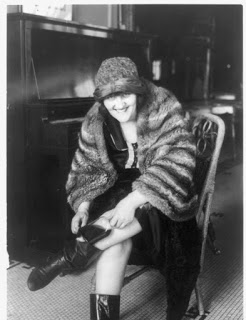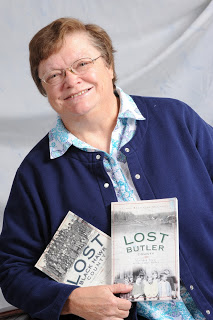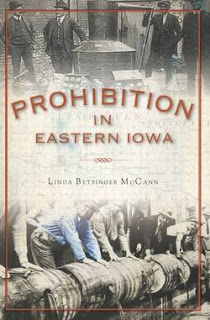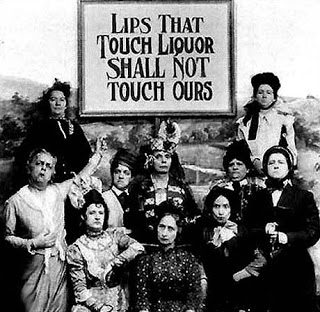PROHIBITION IN EASTERN IOWA
By: Linda Betsinger McCann
Published: June 2014
Publisher: The Iowan Books
Non-Fiction
When Linda McCann would visit cemeteries, she realized she had stories to share while telling her granddaughter about their ancestors. In her research, she realized her family was a descendant of the founder of Shellrock. No one in her family knew this information and she was curious to find out what other important pieces of family history her family didn’t know. This began her quest to share the stories of her family’s history as well as many others. She began by starting the historical society in Shellrock. People would give her items, like artifacts from towns like Coster that no longer exist. McCann realized it was important to preserve these items because those towns were important enough for people to name. When her granddaughters were 8 and 10, she took them to Irma, a lost town with only one house left. Her granddaughters didn’t understand why they were there and McCann told them their grandmother was born there. The girls replied by asking where the hospital was. McCann knew there was a history lesson that needed to be taught that wasn’t being shared in our schools. She set out writing her “Lost Counties of Iowa” series of books such as LOST CEDAR COUNTY and LOST LINN COUNTY.
It seems McCann may have opened a can of worms, because as she travels to communities and begins sharing her stories from the many books she has written, she is often exposed to new stories that lead her in a direction for a new book. This is how her book, PROHIBITION IN EASTERN IOWA began. After a discussion about the train that led from Waverly to Waterloo, the audience began sharing stories about how Bremer County was a wet county and Black Hawk was a dry county. They shared how men would fill suitcases in one county and ride the train back to another in order to get alcohol. It piqued her interest even more when in other locations, people didn’t know that Prohibition was a law in Iowa. This began her quest to share those stories.
Much of McCann’s research for her prohibition book was taken from newspaper articles noting arrests, gun battles, and even murders in our quiet rural communities. McCann is aware that time was running out to gather stories from living people who experienced prohibition and set out to talk to as many of them as she could find. Surprisingly, there were several who were not willing to share their stories or name names due to the shame. Many of the farm families in Iowa were used to their corn selling for $5/bushel in 1917. Times were good and families were able to get by. Then by 1923, corn was selling for just $.25/bushel and farmers couldn’t pay their bills or feed their families. Bootlegging and making and selling alcohol was a way for them to stay afloat. Most of the law enforcement chose to look the other way, knowing that farmers needed this to survive. As long as they didn’t call attention to themselves, the police usually ignored them. Then the mob moved to Iowa and started taking over which made things more dangerous for farmers and police.
 |
| A true bootlegger – photo supplied by author |
McCann has found it interesting that in her research, nearly every community stated that Al Capone was in their town doing something. Every time she would hear this bit of history, she would laugh to herself, wondering how Capone could be in all these places yet still work in Chicago. She doesn’t doubt Capone was in Iowa but wonders if all the sightings are more rumor than fact. She was surprised by all the murders and gun battles that took place in once quiet, rural communities over the making and selling of alcohol.
The Iowa Women’s Christian Temperance Union (WCTU) organized at the same time the National organization formed in 1874 and stayed active until 1930. Iowa’s WCTU may be best known for its Vinton, Iowa president who was killed in 1925. Her murder is still unsolved today. Newspapers would run editorial ads to promote WCTU and other groups that supported prohibition. Once such ad is sure to give a chuckle, “Lips that touch liquor shall not touch ours”.
Many loopholes were created to escape the laws during Prohibition. Pharmacies and churches were able to continue to purchase alcohol for medicinal and religious reasons. When I read that ten gallons of wine per adult were allotted for each church per year, I had to stop and do the math. If each adult went to church once a week that meant each adult could have approximately 24 ounces of wine each church service. I’m not sure how much wine other churches serve at their communion, but I know we don’t get that much! These loopholes were interesting pieces to the numerous stories shared in McCann’s book.
If you are one of my local readers….
To hear more of her stories, especially those that pertain to Benton County and the surrounding areas, come to the Van Horne Public Library 106 Main St, on Thursday, September 8, 2016, at 7:00 PM. Just down the street, Cornerstone Apothecary will be offering a wine tasting from 5:00 – 7:00 PM. Refreshments will be available at the library as well.
McCann will have copies of her books and will be eager to hear stories that she just might put into her next book. She is currently writing about the Civilian Conservation Corps, a camp that was just outside Waverly as well as locations in Belle Plaine and Marion. These camps were part of creating Backbone State Park as well as helping with soil erosion and drought relief. She is willing to talk to anyone who may have had family members that worked in these camps. She is also working on a Lost Towns of Benton County book and is looking for history from these communities.
Her books are available at www.Iowan.com.
 |
| Linda Betsinger McCann |
Linda Betsinger McCann has always loved Iowa history. She became an RN and worked in the profession for many years. When she had the time to get involved in genealogy, her appetite for local history was wetted. Linda has since written five books in the LOST TOWNS series and has plans for more. While researching for her books, other topics come up. She has since written other books chronicling the history of Iowa. Linda enjoys speaking to schools and groups about her books. She can be reached through her publisher, www.Iowan.com or through her Facebook page Lost Towns of Iowa, HERE.
A post from today, 8 years ago – Politics at Home
A post from today, 7 years ago – The Old Hymns
A post from today, 2 years ago – DIY Decoupage Letter “G”
A post from today, 1 year ago – Book Review: 30 Lessons for Loving By Karl Pillemer, PhD
Posted in Blog
Posted Under Author, Book Review, historical non fiction, Interview, Iowa, Linda Betsinger McCann, non-fiction, Prohibition


